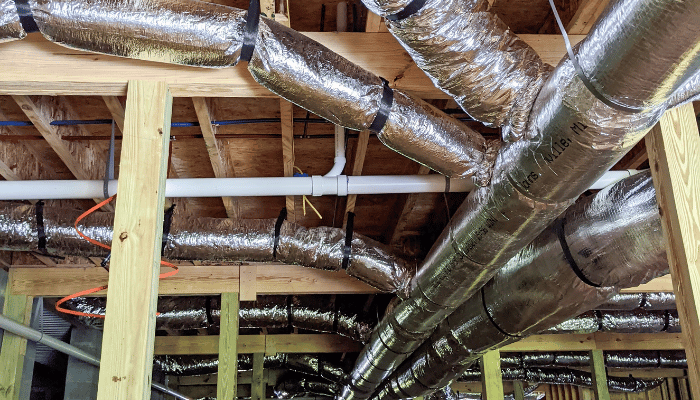Embarking on the journey to install HVAC ductwork in your home can be a significant investment. However, at Energy HVAC Services, we believe it’s an investment that should deliver value, comfort, and efficiency. We understand that every home is unique, and so are its HVAC needs. That’s why we’re committed to providing tailored solutions that fit your specific requirements and budget. Whether you’re installing a new system or upgrading an existing one, our team of seasoned professionals will guide you through each step, ensuring a seamless and efficient process. We provide transparent and competitive quotes, leaving no room for hidden costs or surprises. With Energy HVAC Services, you’re not just getting a service; you’re gaining a partner dedicated to enhancing your home’s comfort and value.
HVAC (Heating, Ventilation, and Air Conditioning) systems are an essential part of every modern home, providing us with a comfortable living environment regardless of the weather outside. However, the efficiency of these systems is dependent on well-installed and properly functioning ductwork. In this article, we delve into the cost to install HVAC ductwork, factors affecting these costs, and why hiring professional HVAC ductwork contractors like Energy HVAC Services is essential.
Understanding HVAC Ductwork
HVAC ductwork, often simply referred to as “ductwork,” forms the backbone of any heating, ventilation, and air conditioning system. Essentially, ductwork is like the circulatory system of your home, working quietly behind the scenes to distribute conditioned air to every room.

Cost to Install HVAC Ductwork
Here’s a more in-depth look at its function and components:
Function of HVAC Ductwork
The primary function of ductwork is to distribute air flow from your HVAC system throughout your home. It carries heated or cooled air from the central HVAC system and delivers it to various rooms. This ensures a consistent temperature throughout your home, regardless of the outside weather conditions.
In addition to distributing conditioned air, the ductwork also helps to remove stale air and maintain good air quality within your home. It does this by pulling stale air back to the HVAC system, where it gets filtered before being recirculated.
Types of Ductwork Material
Ductwork can be constructed from various materials, each with their own pros and cons:
- Metal Ducts: These are often made from galvanized steel or aluminum. They are durable and resistant to mold and pests. However, they are also more expensive and can sometimes be noisy due to thermal expansion and contraction.
- Fiberglass Duct Board: These ducts are composed of fiberglass strands bonded with a special resin. They are known for their excellent thermal insulation properties. However, they can potentially harbor mold if they become damp.
- Flexible Ducts: Made of a wire coil covered by a flexible, plastic material, these ducts are lightweight and can be routed around obstacles. However, they can be less efficient than other types if not installed correctly.
Understanding Ductwork Design
The design of your ductwork system plays a vital role in the efficiency of your HVAC system. The ductwork should be designed in a way that evenly distributes air throughout the house. Too many bends and turns can reduce efficiency and cause the HVAC system to work harder.
The ductwork should also be appropriately sized for your home. If the ductwork is too large, it may not effectively distribute the air, leading to some rooms being too cold or too warm. If it’s too small, the HVAC system may have to work harder to move air, leading to increased energy usage.
In summary, understanding HVAC ductwork involves knowing its function, the different types of ductwork materials available, and the importance of proper ductwork design. Whether you’re considering a new HVAC ductwork installation or replacing existing ductwork, these factors will play a critical role in your decision-making process. As always, it’s wise to consult with HVAC professionals like those at Energy HVAC Services for advice tailored to your specific circumstances.
Factors Affecting the Cost to Install HVAC Ductwork
The cost of new AC ductwork or HVAC ductwork installation can vary significantly depending on several factors:
- Size and layout of the home: Larger homes or those with complex layouts may require more ductwork, increasing the total cost.
- Type of ductwork material chosen: Different materials have different costs. Metal ducts, although more durable, may cost more than plastic or fiberglass ones.
- Complexity of the ductwork system: A system requiring custom fittings or dealing with numerous obstacles can escalate costs.
- Labor costs: This usually depends on the duration and complexity of the project. Remember to factor in the cost of HVAC ductwork installation contractors.
- Potential home modifications: If your home needs adjustments to accommodate the new ductwork, these modifications will be an added cost.
- Additional costs: Additional items like insulation, custom fittings, and system testing can also affect the total HVAC with ductwork cost.
Breakdown of Potential Costs to Install HVAC Ductwork
Let’s delve into a more detailed breakdown of potential costs. Materials can range widely depending on what’s chosen, with metal ductwork being the most expensive. Labor costs can also range widely depending on your location, the complexity of the job, and the expertise of the HVAC ductwork installation contractors near you. Additional costs like insulation, custom fittings, and system testing must also be accounted for. Remember, while cost considerations are important, focusing solely on the cost can lead to subpar work that may cost more in the long run.
Importance of Professional HVAC Ductwork Installation
Professional HVAC ductwork installation is crucial to the effectiveness, efficiency, and longevity of your HVAC system. Here are some reasons why you should always hire a professional, like Energy HVAC Services, for this important task:
- Proper Sizing: HVAC ductwork must be correctly sized for your home and HVAC system. If ductwork is too large or too small, it can create numerous problems, including uneven heating and cooling, inefficient energy use, and increased wear and tear on your HVAC system. Professionals have the knowledge and tools to correctly calculate and install the right size ductwork.
- Sealing and Insulation: Proper sealing and insulation of ductwork are critical to prevent air leaks, which can significantly decrease your HVAC system’s efficiency. A professional will know how to adequately seal all joints and insulate the ductwork to prevent heat loss or gain.
- Correct Layout and Installation: The layout of your ductwork plays a significant role in the efficiency of your HVAC system. Too many sharp bends or long stretches can reduce airflow and make your system work harder. Professionals know how to design and install ductwork to maximize efficiency and airflow.
- Building Code Compliance: Professional and local HVAC contractors are knowledgeable about local building codes and regulations. They can ensure that your ductwork installation complies with all relevant safety and construction standards, preventing potential legal issues down the line.
- Long-Term Savings: While hiring professionals might seem like an added expense initially, the long-term savings can be substantial. Properly installed ductwork can lower your energy bills, reduce the need for repairs, and extend the life of your HVAC system.
- Peace of Mind: When you hire a professional, you gain peace of mind knowing that the job has been done correctly. You also typically receive a warranty or guarantee on the work, providing additional security.
In conclusion, professional HVAC ductwork installation is a smart investment in the comfort, efficiency, and value of your home. With HVAC installation companies like Energy HVAC Services, you can be assured of expert HVAC installation that will serve you well for years to come..
Choosing the Right HVAC Service Provider
When installing new ductwork, consider factors like experience, certifications, reviews, transparency, availability, the range of services, warranties, and customer service. This is where Energy HVAC Services shines as a reliable choice for HVAC ductwork installation near you.
In summary, the investment in new AC or HVAC ductwork, while substantial, promises long-term benefits such as enhanced comfort, improved air quality, and increased energy efficiency for your home. At Energy HVAC Services, we believe in getting it right the first time when it comes to HVAC ductwork installation. Our commitment to providing transparent pricing, exceptional service, and a team of seasoned professionals ensures that we’re fully equipped to meet all your HVAC ductwork needs.
Frequently Asked Questions
How does the size of the home affect the cost to install HVAC ductwork?
The size of the home directly influences the amount of ductwork required, leading to higher material and labor costs for larger homes. More extensive homes may also present complex installation challenges, requiring additional time and resources. As a result, larger homes typically have higher HVAC ductwork installation costs.
Does the cost to install HVAC ductwork vary based on the ductwork material?
Yes, the cost to install HVAC ductwork can vary based on the material used. Common materials like sheet metal, fiberglass, and flexible ducting each have different price points. The choice of material impacts both the material cost and the complexity of installation.
Is there a cost difference between installing ductwork in a new construction versus an existing home?
Installing ductwork in a new construction is often less expensive and complicated than retrofitting an existing home, as the spaces for ducts are planned and more accessible. In contrast, existing homes may require more labor-intensive work to navigate obstacles and fit ducts into limited spaces, potentially increasing costs.
What factors influence the overall cost of installing HVAC ductwork?
The cost of installing HVAC ductwork is influenced by various factors including the size of the system, the complexity of the ductwork layout, the type of materials used, and the labor costs in the local area. The condition of existing ductwork and accessibility also play significant roles in determining the overall cost.
Are there any additional costs associated with ductwork installation, such as labor or permits?
Additional costs associated with ductwork installation can include labor, which varies by region and contractor, as well as potential permit fees. In some cases, the removal and disposal of old ductwork may also incur additional charges.





